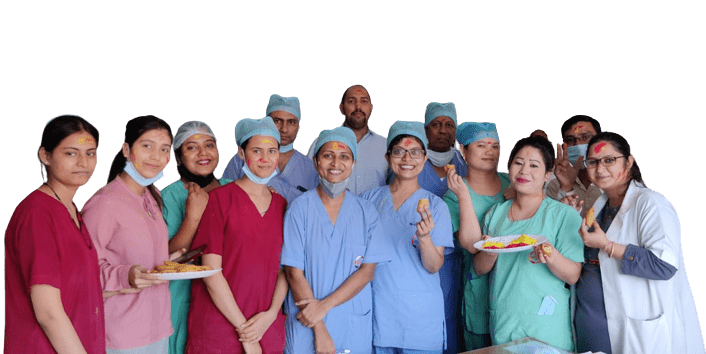Need Help?
We are here to help.
We care for each one who come to us with hope in their hearts.

Today we talk about our work on tuberculosis and infertility. This was presented this year in London RCOG Conference. There has been a lot of debate on this topic especially whether and when and for how long we should be giving antitubercular treatment. There are multiple tests for tuberculosis .There can be microscopic examination, culture, PCR along with the initial test of monteaux and quantiferon gold.
A very good paper by many scientists including Dr JB Sharma from all India Institute suggests the composite reference screening ( CRS ) which has also been suggested by the WHO. https://www.sciencedirect.com/science/article/abs/pii/S0019570722000439 . In CRS history, physical examination and tests are put all together to decide whether ATT should be started or not.
History includes repeated failed IVF Cycles or repeated miscarriages without any underlying or a detectable cause. Examination could reveal a fixed uterus or multiple pelvic masses. Ultrasound could reveal a thin endometrium or adnexal mass . Laparoscopic findings of tuberculosis could be in the form of a python shaped tube , beaded tubes or adhesions in the abdomen . When we do a hysteroscopy it could be a scarred uterus. All these history ,examination findings plus laparoscopic and hysteroscopy findings combine to be give the CRS score which allows to start the antitubercular treatment.
This treatment is usually given for six months. It consists of two months of intensive treatment of rifampicin, isoniazid, pyrazinamide and ethambutol followed by four months of three drug treatment. Our paper that we presented saw about more than 50 patients with similar criteria . After receiving antitubercular treatment to them we found a significant increase in IVF pregnancy rates almost touching to 55 percent per embryo transfer.This is an important finding we’ve shared it in the world forum. We would like more and more uh doctors especially from countries where tuberculosis is common to collaborate these findings and see whether this treatment really helps our patients suffering from infertility.
Antitubercular Treatment (ATT) in Infertility: A Complex Landscape
The connection between tuberculosis (TB) and infertility is a complex and multifaceted one. It has long been recognized that TB can have a profound impact on reproductive health, particularly in women. The involvement of the reproductive organs, including the fallopian tubes, uterus, and ovaries, can lead to infertility, miscarriages, and a range of gynecological complications. Therefore, determining the optimal approach to treating TB in the context of infertility is of paramount importance.
Multiple Tests for Tuberculosis
Before delving into the treatment aspect, it’s crucial to understand that diagnosing TB accurately is the first step. Various diagnostic tests are available, and they play a pivotal role in determining the course of treatment. These tests include:
The Role of Composite Reference Screening (CRS)
One of the pivotal discussions in the field of TB and infertility centers around the use of Composite Reference Screening (CRS). CRS, as recommended by the World Health Organization (WHO), combines various factors to make an informed decision regarding the initiation of ATT. These factors include:
These various elements, when combined, create the CRS score. This score is a crucial determinant in deciding whether to initiate antitubercular treatment. It is important to recognize that making this decision is not straightforward and necessitates a comprehensive evaluation by a skilled healthcare provider.
Duration and Components of Antitubercular Treatment (ATT)
The standard protocol for ATT in cases of genital tuberculosis usually spans six months. It involves an initial two-month phase of intensive treatment with a combination of drugs, including rifampicin, isoniazid, pyrazinamide, and ethambutol. This is followed by a four-month phase of three-drug treatment.
Our Research and Findings
Our research presented at the RCOG Conference focused on more than 50 patients who met the criteria for ATT based on CRS scoring. After receiving the six-month ATT regimen, we meticulously tracked their progress. The results were striking and offered valuable insights into the effectiveness of this approach.
We observed a significant increase in in vitro fertilization (IVF) pregnancy rates, with success rates approaching an impressive 55 percent per embryo transfer. This finding is not only a testament to the potential efficacy of ATT in infertility cases but also underscores the need for further exploration of this treatment approach.
Collaborative Efforts and Future Directions
The impact of our research extends beyond the presentation at the RCOG Conference. We recognize the importance of collaboration in the field of medicine and research. We urge healthcare professionals, especially those practicing in regions where tuberculosis is prevalent, to consider our findings and explore the potential benefits of ATT in the context of infertility.
Further research is needed to validate and expand on these findings. Large-scale studies, multi-center collaborations, and continued data collection are essential to establish a robust evidence base for the use of ATT in infertility cases. Such endeavors can potentially offer new hope to individuals and couples struggling with infertility due to TB-related factors.
We care for each one who come to us with hope in their hearts.

Disclaimer – Dr Kaberi is not associated with any Hosptial/Clinic other than “Advanced Fertility and Gyne Center (AFGC)”. AFGC has only four centers at present 1. “Lajpat Nagar” 2. “CR Park Delhi” 3. “Noida” 4. “Gurgaon“.